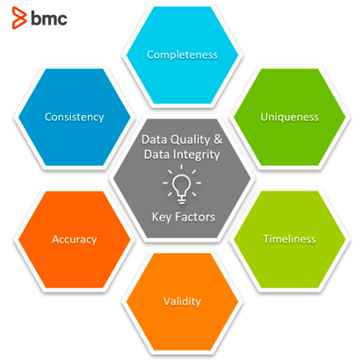
Data is what drives business today. It fuels decisions, lends insights to strategies, and finds problems you may not have known existed. 70% of private equity firms agree that analytics have become increasingly more important. But there's an inherent problem: Data presents itself as fact.
The truth is, there's a hidden element: trust. For your decisions and strategies to be the right ones, your business must prioritize data integrity and quality. Let's dive into just what "data integrity" means and how dealmakers can achieve it.
The quick definition of data integrity is the measure of how accurate and consistent data is throughout its lifecycle. Data integrity also includes some regulatory compliance measures such as CCPA and GDPR, after all the goal of good data integrity is to maintain its accuracy for as long as it's kept.
When discussing data integrity, it's easy to confuse it with data quality. Generally speaking, the two terms are often used interchangeably, but the two are actually distinct. To better paint the picture, let's assume you have the phone number of a potential decision-maker for a new opportunity:
Of course, whenever you encounter issues with data after such an error has occurred, it's difficult to tell which type of problem you have with your data. This is why it's incredibly important to take proactive measures to ensure data integrity throughout its lifecycle.

For modern private equity firms, especially those interested in bootstrapped companies, data is the foundation of how business is done. While deals used to be fueled by networking and who you knew, online sourcing and private company intelligence platforms are becoming the ace in the hole for finding new opportunities. However, no matter how deals are sourced, data integrity must be a top priority if your private equity firm is to know which deals are the right moves.
Example #1
Imagine a situation where a member of your firm is trying to secure a new deal. They first use one of your firm's data sources to identify a potential target. Another member then searches for that company on social networks and starts gathering information. The rest of the team then each goes to their own separate channels and pools together the information they all found and inputs it into the CRM.
But lo and behold, when it comes time to initiate contact, your team finds their emails are bouncing. Why? Somewhere along the path from sourcing to data entry to using the data, the phone number and email address field values were switched. Now, your team has to find where the error happened and resolve it before it can continue with the opportunity. Hopefully a competitor hasn't beat them to the punch!
Example #2
Here's another example. As travel opens up across the world, your firm is eager to resume the "old methods" of sourcing deals: networking at in-person meetings and conferences. Your dealmakers target the most relevant ones and identify several target companies to try to make contact with at the event. But there's a problem: according to your CRM, every contact at one of your target companies has a different phone number and title, but the same name and email address.
It's clear that even though your data source offers lots of individual data points, somewhere between the data being sourced and it entering your CRM, the integrity of the data was not maintained. Perhaps a field was mis-mapped during an integration? Or maybe your team used an incorrectly-formatted CSV file to push the data across systems. Whatever the case, your firm is now left to pick up the pieces.
As the above data integrity examples show, firms must make the accuracy and consistency of their data a priority to be successful. The solution to data integrity for a lot of firms will be automation and AI. In fact, over 90% of private equity firms believe AI will disrupt the industry within the next two years. And automation can indeed help solve the problem of data integrity for a lot of firms.
Not only does automation provide cost and time savings by eliminating the need for manual data entry, but solutions that integrate with your tech stack can also ensure data integrity throughout its lifecycle. This is one reason why integrations with your CRM should be high on the list of considerations when evaluating an intelligence platform.
Although automation and AI provide ways to scale your data operations, they operate more effectively with human supervision. While machines may be able to validate whether an email address field has the right structure, they cannot determine if it's correct. People must still be involved in data integrity and quality processes to ensure the data being used for decisions can be relied upon. AI can lend insights and show trends, but to put those insights into context and determine if an opportunity really is the right one, human judgment is essential.
The combination of automation, AI, and humans is where certain data sources have an edge. For instance, Sourcescrub's technology surfaces millions of data points each month on private companies. The machine learning processes that collect the data are continuously tested and refined with human supervision to provide the highest quality and integrity insights.
Want to see how it works? We'd love to show you! Schedule some time to chat with us here.